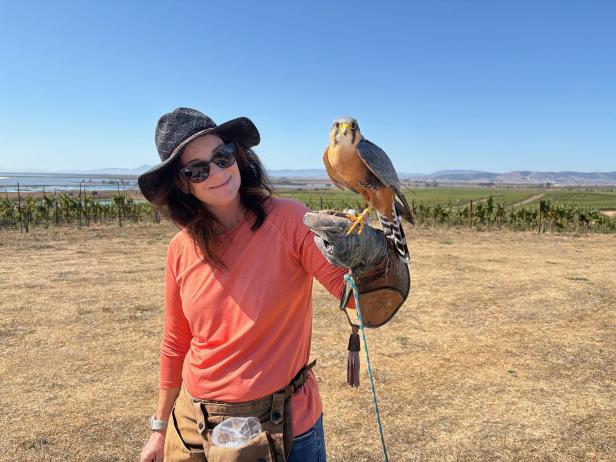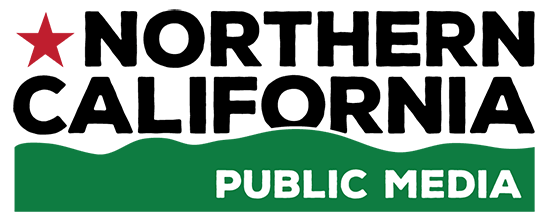 photo credit: Tina Caputo
photo credit: Tina CaputoRebecca Rosen with Hermes.
Harvest is a busy time in California wine country—not just for picking crews and winemakers, but also for some lesser-known vineyard workers.
When grapes ripen on the vines, wild birds like starlings and finches can’t wait to swoop in and eat the sweet, juicy fruit.
Rather than risking their precious crop, some winemakers are turning to trained falcons for help.
“There are telephone wires up above ground that run on both sides of the property,” said Chris Kajani, head winemaker at Bouchaine Vineyards in Napa. “So the birds sit on top of those wires, and as you can imagine, they come down and snack on grapes all day.”
Even worse, Kajani said, is the birds don’t just eat the grapes whole. Instead, they peck holes in the berries, which leads to mold issues.
“Unfortunately, some of our very top blocks are right underneath these telephone lines I was talking about,” Kajani said. “So it's some of our best fruit that gets damaged and has to be just thrown away.”
Kajani tried putting nets over the vines to protect the fruit, she added, but that can be expensive—and it wasn’t all that effective on its own.
Then, she met Rebecca Rosen.
Rosen is a master falconer and the founder of Authentic Abatement.
“There are certain areas where the birds have focused on the most… right now is our freshly planted Chardonnay,” Rosen said. “This is the first year that it is bearing fruit, and it has a very small canopy, which is sort of like a beacon, saying, ‘Come eat me!’”
Rosen says she typically works in Napa vineyards for three months during the harvest season, commuting from Lodi each day to fly her team of five falcons.
She likes to say her unconventional career was inspired by her lack of skill waiting tables.
“I was not a very good waitress,” Rosen said. “I don't know if anybody remembers Carla from ‘Cheers’ … and I met somebody that was doing falconry bird abatement, and I was like, ‘Well, I don't really care about birds, but it beats waitressing, so I'll give it a try!’”
Twenty-three years later, she’s still doing it. And, for the record, Rosen does care about birds now.
One of her favorite fliers is an aplomado falcon named Hermes. He’s about the size of a crow, with an orange breast and a bright yellow beak. Very handsome.
Before she can let Hermes fly off to do his thing in the vineyards, Rosen clips a small GPS tracker onto his feathers. That’s to make sure she can find him if he decides to go exploring.
When he takes off and circles overhead, she said, “He's sort of just inspecting the area, trying to see where there's any birds he might ambush. He does have a hunter's heart.”
After the falcon makes a couple circles over the vineyard, Rosen calls him back to land on her glove for a treat. In this case, it’s a chunk of mouse—Hermes’ favorite.
Although Rosen’s falcons are raised in captivity, there’s no guarantee that every bird will be willing to do this work.
“Falconry is a choice that the bird makes,” she said. “They choose to come back to us.”
Hermes is a confident bird. He will often go after a bird much larger than himself, like a Cooper’s hawk.
Rosen says the goal is not for the falcons to kill other birds, but to scare them away. Eventually, they learn to go elsewhere for their tasty grape buffet.
“If I can get them to just go congregate in the neighbor's stuff,” she said, “then of course, it's to my benefit.”
During harvest? It’s every bird for himself.

 Live Radio
Live Radio